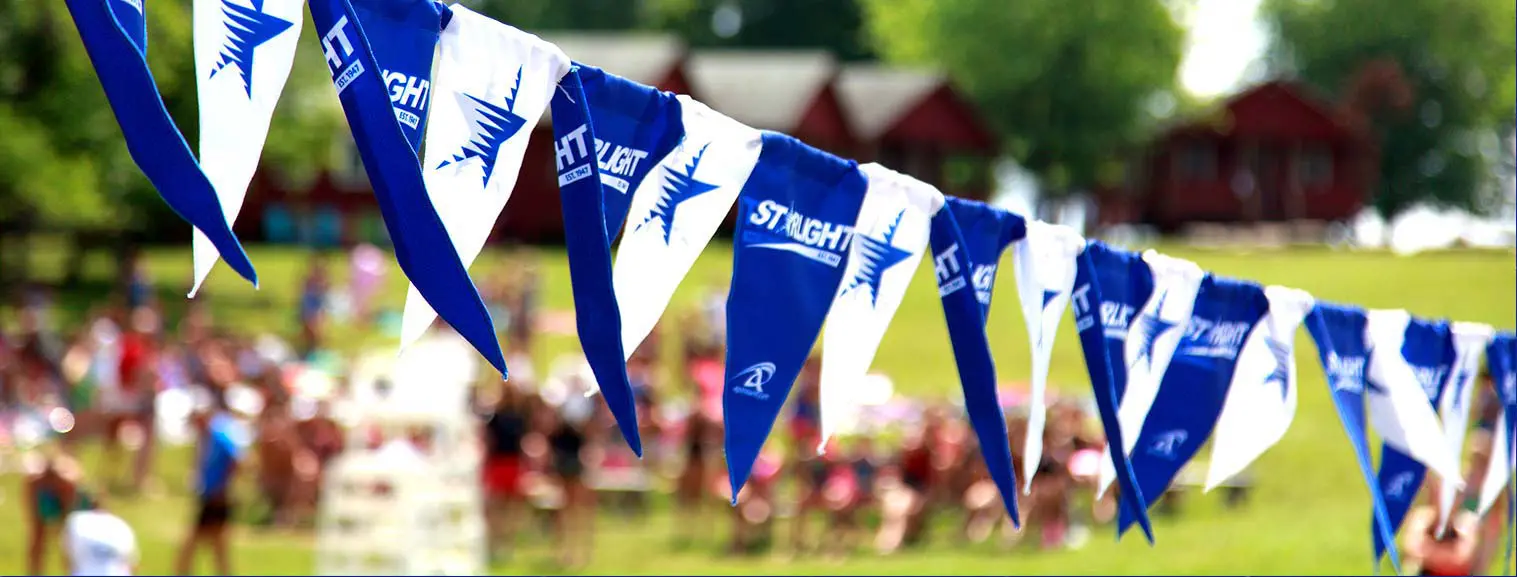Posts Tagged ‘summer camp’
Missing our friends!
Tuesday, August 26th, 2014Why Summer Camp is More Important Now than Ever
Thursday, July 3rd, 2014 As the digital age in which we live seems to be accelerating, it’s easy to dismiss traditions that are not technology focused, such as summer camp. There is an argument to be made, however, for why summer camp is more important than ever for that very reason. There is a lot to be said for effort. While technology has done much to simplify our lives and make life more efficient than ever, it requires less and less effort from users. Increasingly, people are shying away from tasks that can’t be accomplished within a few keystrokes. Effort, however, not only requires certain qualities, it facilitates them as well. Effort requires energy. Energy, by definition, is the mental or physical strength that allows individuals to accomplish goals. Without physical or mental strength, energy cannot be generated. Without energy, there cannot be effort. Without effort, goals cannot be achieved. There are several very strong keywords to success linked together in those few sentences: effort, energy, strength, goals, accomplishment. At the very least, there is an implied relationship in the linking of these words. In such a sense, using technology to “accomplish” goals is merely a façade. In essence, users are not “accomplishing” anything. They’re merely led through a series of tasks to something that has already been completed for them in order to make their lives easier.
As the digital age in which we live seems to be accelerating, it’s easy to dismiss traditions that are not technology focused, such as summer camp. There is an argument to be made, however, for why summer camp is more important than ever for that very reason. There is a lot to be said for effort. While technology has done much to simplify our lives and make life more efficient than ever, it requires less and less effort from users. Increasingly, people are shying away from tasks that can’t be accomplished within a few keystrokes. Effort, however, not only requires certain qualities, it facilitates them as well. Effort requires energy. Energy, by definition, is the mental or physical strength that allows individuals to accomplish goals. Without physical or mental strength, energy cannot be generated. Without energy, there cannot be effort. Without effort, goals cannot be achieved. There are several very strong keywords to success linked together in those few sentences: effort, energy, strength, goals, accomplishment. At the very least, there is an implied relationship in the linking of these words. In such a sense, using technology to “accomplish” goals is merely a façade. In essence, users are not “accomplishing” anything. They’re merely led through a series of tasks to something that has already been completed for them in order to make their lives easier.
In “unplugging,” summer camp essentially provides campers with the opportunity to control the outcome of their summer by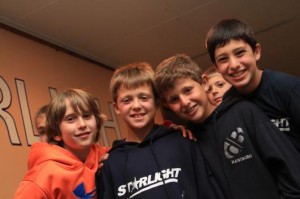 requiring legitimate effort to accomplish goals. Perfecting a tennis serve cannot be done with a few clicks of a mouse. Pressing the “Return” key won’t finish a ceramics project. Communicating with friends is more than logging into an Instagram account. Campers must engage in their camp environment.
requiring legitimate effort to accomplish goals. Perfecting a tennis serve cannot be done with a few clicks of a mouse. Pressing the “Return” key won’t finish a ceramics project. Communicating with friends is more than logging into an Instagram account. Campers must engage in their camp environment.
When given a challenge at summer camp, they can’t simply skip to the head of the class by typing a search into Google. They must apply their knowledge to come up with a solution. When solving a problem involves more than one camper, they must communicate in order to ultimately come to a consensus about which solution is the best and why. In short, they must apply themselves. Application of oneself not only requires, effort, energy, and strength, it generates them. Campers see firsthand the rewards of hard work. They not only learn how to legitimately achieve goals but to set them as well. They gain a better understanding of the reality of achievement. It requires work, a sharp mind, and the ability to communicate—lifelong skills that form the foundation for success.
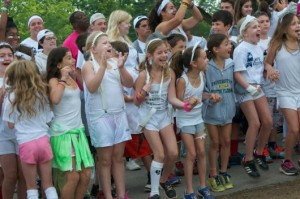 Beyond the mental agility that children gain from summer camp, there is the literal aspect of activity. Children move around at camp…all day. It’s very easy in a technology laden world, where so many aspects of daily life have become virtual, to be complacent. The human body naturally preserves energy whenever possible. Summer camp showcases the payoff of physical effort on a daily basis by producing tangible results of campers’ efforts through sports instruction and competition as well as hobby programs. Camper self-confidence grows as the products of effort are realized.
Beyond the mental agility that children gain from summer camp, there is the literal aspect of activity. Children move around at camp…all day. It’s very easy in a technology laden world, where so many aspects of daily life have become virtual, to be complacent. The human body naturally preserves energy whenever possible. Summer camp showcases the payoff of physical effort on a daily basis by producing tangible results of campers’ efforts through sports instruction and competition as well as hobby programs. Camper self-confidence grows as the products of effort are realized.
Summer camp is not merely a break from technology for campers. It’s a reminder that life is best realized outside of technology.
A College Case for Camp
Thursday, February 20th, 2014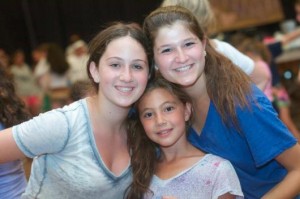 One of the most understated advantages of summer camps is how much they do to help prepare older campers for life after the summer. Increasingly, sleepaway camps are taking an interest in providing older campers with valuable experiences that will help through the college application process and later in life. Leadership programs, college visits, and community service are just a few of the offerings of summer camps for older campers, and statistics show that there is a college case for them.
One of the most understated advantages of summer camps is how much they do to help prepare older campers for life after the summer. Increasingly, sleepaway camps are taking an interest in providing older campers with valuable experiences that will help through the college application process and later in life. Leadership programs, college visits, and community service are just a few of the offerings of summer camps for older campers, and statistics show that there is a college case for them.
There is a rising trend of college admissions foregoing standardized test scores in favor of applicants with diverse backgrounds and experiences. An article on www.education.com revealed that colleges are realizing that high standardized test scores are not necessarily indicative of good students. Rather, those students who demonstrate well-rounded backgrounds with involvement in a variety of activities, such as summer camp, generally make good students because they learn valuable skills through these activities. Beyond the activities themselves, however, colleges are considering the value of them by examining how applicants engaged in them. In other words, colleges considering activities in lieu of test scores aren’t just placing heavy weight on applicant involvement in activities such as summer camp, they’re placing considerable weight on what applicants did while involved. This creates prime opportunity for summer camps to step up and showcase just how much campers benefit from returning each summer, and many camps are answering the challenge.
Campers attend summer camp for several years—sometimes as many as eight. The summer camp environment is the perfect place for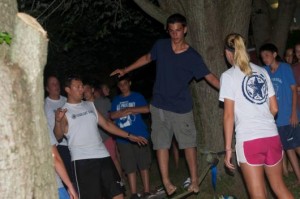 them to engage in fun activities with friends that teach skills that college admissions teams find valuable. Through special activities and opportunities to take charge of younger campers, teenage campers learn to be effective leaders. Some camps also offer extended counselor training programs that provide high school campers with the opportunity to take on staff roles at camp. Often, these types of programs are the first work experience for campers eager to take on leadership roles at the beloved summer home where they grew up.
them to engage in fun activities with friends that teach skills that college admissions teams find valuable. Through special activities and opportunities to take charge of younger campers, teenage campers learn to be effective leaders. Some camps also offer extended counselor training programs that provide high school campers with the opportunity to take on staff roles at camp. Often, these types of programs are the first work experience for campers eager to take on leadership roles at the beloved summer home where they grew up.
Beyond counselor training programs, or sometimes in place of them, a handful of camps also offer exclusive, highly customized programs in which campers learn how to communicate effectively and support each other. Such programs teach inclusion and help older campers develop a resistance to falling prey to common teenage stumbling blocks such as gossip, bullying, or negative peer pressure. Camps often work with professional psychologists, counselors, life coaches, and even nutritionists to maximize the benefits of these programs. These professionals are frequently featured guests who engage campers in special activities that demonstrate life lessons in fun and engaging ways.
 There is also a trend in camps taking on the task of taking campers on tours of a variety of college campuses. Many camps in the New England area are within proximity to some of the most esteemed institutions of higher learning in the nation, and they arrange formal tours so that their older campers can actually get a glimpse of college life. Moreover, college tours prompt students to begin considering the qualities for which they are looking in a college, such as size, geographic location, and extra-curricular offerings by seeing firsthand how these factors affect the college experience.
There is also a trend in camps taking on the task of taking campers on tours of a variety of college campuses. Many camps in the New England area are within proximity to some of the most esteemed institutions of higher learning in the nation, and they arrange formal tours so that their older campers can actually get a glimpse of college life. Moreover, college tours prompt students to begin considering the qualities for which they are looking in a college, such as size, geographic location, and extra-curricular offerings by seeing firsthand how these factors affect the college experience.
Community service programs are also a rising trend in camping, surprisingly, often by camper request. Campers grow up in camp learning to be a member of a community. They develop such a respect for that community and everything it has contributed to their lives that they actually want to give back. They see the value in passing on the rites and traditions with which they grew up to others. While some community service programs stay within the camp campuses, others reach well beyond camp and extend into the local or even national community. Camps openly support charities and plan special events dedicated to those causes, which means that campers are learning from an early age the value of community involvement.
community. They develop such a respect for that community and everything it has contributed to their lives that they actually want to give back. They see the value in passing on the rites and traditions with which they grew up to others. While some community service programs stay within the camp campuses, others reach well beyond camp and extend into the local or even national community. Camps openly support charities and plan special events dedicated to those causes, which means that campers are learning from an early age the value of community involvement.
Parents wondering if summer camp is still as beneficial to their children as teenagers as when they were younger need only look at college admission trends. Chances are that camp could be that all important deciding application factor and the skills teenage campers bring away from their final few summers at camp may well be much more valuable than you thought.
5 Reasons Kids Can’t Stop Talking about Camp
Tuesday, January 14th, 2014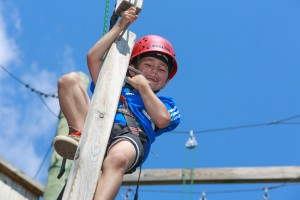 Raise your hand if this happened to you this year—as it does every year right about now. Just when you thought you’ve finally—FINALLY—heard the last of the camp stories, it arrived. Maybe it was the camp video, the camp newsletter…even an invitation to a camp reunion. Whatever it was, it was about camp, reminding you that we’re halfway to another summer, and now you’re hearing that waterskiing or baseball story for, oh, about the 27th time. And raise your hand if you ever find yourself questioning how a few weeks each summer can have such a profound impact on your children that they’re still talking about it in the dead of winter as if it was just a couple of weeks ago. Not that you mind. You’re very happy that your investment in summer camp has been a good one. But you still wonder. Well, here are a few things to consider.
Raise your hand if this happened to you this year—as it does every year right about now. Just when you thought you’ve finally—FINALLY—heard the last of the camp stories, it arrived. Maybe it was the camp video, the camp newsletter…even an invitation to a camp reunion. Whatever it was, it was about camp, reminding you that we’re halfway to another summer, and now you’re hearing that waterskiing or baseball story for, oh, about the 27th time. And raise your hand if you ever find yourself questioning how a few weeks each summer can have such a profound impact on your children that they’re still talking about it in the dead of winter as if it was just a couple of weeks ago. Not that you mind. You’re very happy that your investment in summer camp has been a good one. But you still wonder. Well, here are a few things to consider.
1.) At summer camp, campers get to spend all day, every day with their friends. Before you argue that they get that at school too,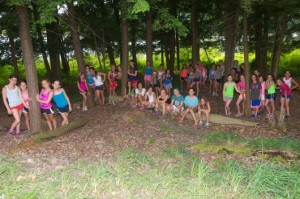 consider this: At summer camp, campers not only spend all day with their friends, they get the opportunity to interact with them. When you think about it, interaction with friends at school is primarily limited to hallway conversations between classes, recess (for younger children), and lunchtime. Sure, they may steal a few exchanges during class at the risk of detention, but for the most part, talking while teachers present lessons (which comprise the bulk of the school day) is generally discouraged. In juxtaposition, summer camp is more like a sleepover that lasts several weeks, and everyday campers get to do something special with their friends. Beat that on the fun-o-meter!
consider this: At summer camp, campers not only spend all day with their friends, they get the opportunity to interact with them. When you think about it, interaction with friends at school is primarily limited to hallway conversations between classes, recess (for younger children), and lunchtime. Sure, they may steal a few exchanges during class at the risk of detention, but for the most part, talking while teachers present lessons (which comprise the bulk of the school day) is generally discouraged. In juxtaposition, summer camp is more like a sleepover that lasts several weeks, and everyday campers get to do something special with their friends. Beat that on the fun-o-meter!
 2.) Children can be themselves at camp. Not that there aren’t rules to follow at summer camp, too. But the rules tend to be the kind that promote being at ease. They are considerably more relaxed than those imposed at school, and even those pertaining to appropriate conduct in social situations are somewhat lax in comparison to those they have to follow the other ten months of the year. Most restaurants (or their patrons) probably aren’t too excited when children start singing or cheering in the middle of their meal, for example. Most summer camps encourage it.
2.) Children can be themselves at camp. Not that there aren’t rules to follow at summer camp, too. But the rules tend to be the kind that promote being at ease. They are considerably more relaxed than those imposed at school, and even those pertaining to appropriate conduct in social situations are somewhat lax in comparison to those they have to follow the other ten months of the year. Most restaurants (or their patrons) probably aren’t too excited when children start singing or cheering in the middle of their meal, for example. Most summer camps encourage it.
3.) Children get to be independent at summer camp. Not that your children don’t love and adore you, but they like doing things on their own too. Children take a lot of pride in accomplishing something they tried for the first time at camp on their own (with the support of their fellow campers, counselors, and a host of other camp staff as well, of course…but in their minds, it was all them, and that’s okay). It gives them a sense of pride to know that they don’t need Mom and Dad to do everything.
love and adore you, but they like doing things on their own too. Children take a lot of pride in accomplishing something they tried for the first time at camp on their own (with the support of their fellow campers, counselors, and a host of other camp staff as well, of course…but in their minds, it was all them, and that’s okay). It gives them a sense of pride to know that they don’t need Mom and Dad to do everything.
4.) Camp is a youthful environment. Camp is an environment dedicated to youth. Even staff members are young at heart. This doesn’t sound like a big deal, but think about the “real”world from a child’s perspective. It’s basically a place where they are constantly put in check by grownups and reminded about all of the things they can’t do until they are grownups. Camp, in contrast, is a place all about pleasing kids and where they are constantly reminded of why it is so sweet to be a kid.
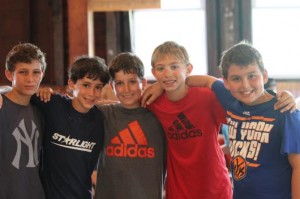 5.) Children observe time differently at summer camp. Really! They do. When the school year begins, so does a countdown that children measure in “months still to go.” It’s a slow moving countdown of which children consistently consider themselves on the backend. There is always still time. When summer camp begins, a countdown also begins. But this countdown is measured in “weeks that have already passed.” Children place themselves on the front end of the camp countdown. In other words, they know that their time at summer camp is limited. From the second they arrive, they set out to make each and every minute count, which increases the intensity of the experience. That’s why those seemingly mundane ‘It’s a camp thing’ or ‘You had to have been there’ stories you hear over and over are so revered by your children. They were actually living so vividly in the moment they experienced them that the moment sticks with them. Not many children share quite the same enthusiasm about, let’s say, their last math exam, for example.
5.) Children observe time differently at summer camp. Really! They do. When the school year begins, so does a countdown that children measure in “months still to go.” It’s a slow moving countdown of which children consistently consider themselves on the backend. There is always still time. When summer camp begins, a countdown also begins. But this countdown is measured in “weeks that have already passed.” Children place themselves on the front end of the camp countdown. In other words, they know that their time at summer camp is limited. From the second they arrive, they set out to make each and every minute count, which increases the intensity of the experience. That’s why those seemingly mundane ‘It’s a camp thing’ or ‘You had to have been there’ stories you hear over and over are so revered by your children. They were actually living so vividly in the moment they experienced them that the moment sticks with them. Not many children share quite the same enthusiasm about, let’s say, their last math exam, for example.
So when the next camp reminder arrives in your mailbox or your inbox and the stories start again, just remember that, for campers, an arrival of anything from camp is like receiving a postcard from Neverland.
2013: Record-Breaking Summer
Thursday, December 19th, 2013It’s almost 2014, but 2013 was record-breaking year of fun, excitement, and all things Starlight! Looking back at this past year, it’s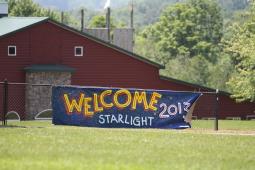 hard to capture all of the great moments that 2013 brought to us. Whether it was the moment stepping of the bus back in June or looking back on the final day of camp in August; the memories still flood our heads even as we are about to put a close to 2013.
hard to capture all of the great moments that 2013 brought to us. Whether it was the moment stepping of the bus back in June or looking back on the final day of camp in August; the memories still flood our heads even as we are about to put a close to 2013.
Reflecting on the great times we had this year, it’s hard to not forget about the great new things we had at camp in 2013. The completely renovated Fieldhouse was an awesome addition to camp where many Wayne County victories, hard fought Olympic basketball games, and many fun activities were held. Within the new Fieldhouse, our new gym and workout facility was an absolute hit for campers and staff. Fieldhouse is one of the most recognized buildings at camp where memories are made and it is sure to make many more in the future.
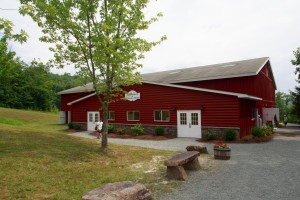 Along with new additions to camp, we can’t forget about all of the highlights and moments that made 2013 great. The opening night campfires are always a great tradition to start off the summer. We also can’t forget the classic moments of singing in the dining room, screaming “Good Morning” to David EVERY morning, watching Jason Glick dance on Friday nights, and cheering during the Week in Review.
Along with new additions to camp, we can’t forget about all of the highlights and moments that made 2013 great. The opening night campfires are always a great tradition to start off the summer. We also can’t forget the classic moments of singing in the dining room, screaming “Good Morning” to David EVERY morning, watching Jason Glick dance on Friday nights, and cheering during the Week in Review.
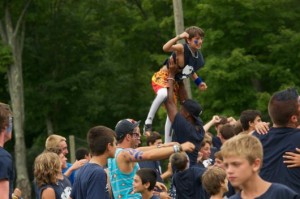 2013 was special for many reasons, not only did our sports have a record breaking summer with the most Wayne County victories recorded to date, but we also had incredible recollection of things like the hilarious Friday Night Live, Heath “Tell Mia Story’s” great performance at Miss Starlight, the Gnome Scavenger Hunt, and who could forget the, the closest Olympics in Starlight History!
2013 was special for many reasons, not only did our sports have a record breaking summer with the most Wayne County victories recorded to date, but we also had incredible recollection of things like the hilarious Friday Night Live, Heath “Tell Mia Story’s” great performance at Miss Starlight, the Gnome Scavenger Hunt, and who could forget the, the closest Olympics in Starlight History!
All in all, each and every camper and staff member have their monumental moments that stick in their heads to what 2013 was all about. While everyone can think about the personal memories they had, it is inevitable that 2014 is bound to be even better!
Benefits of STEM Related Summer Camp Programs
Monday, December 16th, 2013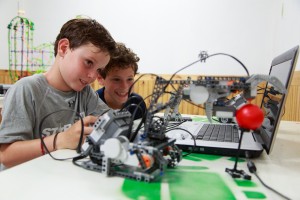 STEM is a popular buzzword—or, more appropriately, acronym–circulating among educational circles, but it might not be a term one might expect to hear within summer camp circles. STEM stands for science, technology, engineering and math, four subject areas to which educators are increasingly striving to give students additional exposure, and summer camps are hopping on the bandwagon. According to the American Camp Association, STEM related activities have been among the most popular additions to summer camp programs over the past five years and for good reason. Summer camp provides campers with an alternative venue to learn in ways that are fun. Classrooms are replaced with the outdoors or facilities designed exclusively for individual programs and class size is vastly reduced allowing campers to be able to take a more intricate, hands on approach to exploring STEM areas through related camp activities. According to the New York Daily News, the average class size in New York, an area in which summer camp is particularly popular, is 25 students. In some schools, class sizes exceed 30 students. STEM related camp programs such as Nature, Rocketry and Radio, are often capped at fewer than a dozen campers per activity period. STEM related programs increasingly prove to be among the most popular with campers. So why are children flocking to educational niche programs? There are likely several reasons.
STEM is a popular buzzword—or, more appropriately, acronym–circulating among educational circles, but it might not be a term one might expect to hear within summer camp circles. STEM stands for science, technology, engineering and math, four subject areas to which educators are increasingly striving to give students additional exposure, and summer camps are hopping on the bandwagon. According to the American Camp Association, STEM related activities have been among the most popular additions to summer camp programs over the past five years and for good reason. Summer camp provides campers with an alternative venue to learn in ways that are fun. Classrooms are replaced with the outdoors or facilities designed exclusively for individual programs and class size is vastly reduced allowing campers to be able to take a more intricate, hands on approach to exploring STEM areas through related camp activities. According to the New York Daily News, the average class size in New York, an area in which summer camp is particularly popular, is 25 students. In some schools, class sizes exceed 30 students. STEM related camp programs such as Nature, Rocketry and Radio, are often capped at fewer than a dozen campers per activity period. STEM related programs increasingly prove to be among the most popular with campers. So why are children flocking to educational niche programs? There are likely several reasons.
First, summer camp provides an informal, laid back setting. There is no homework. There is no syllabus. There are no lectures.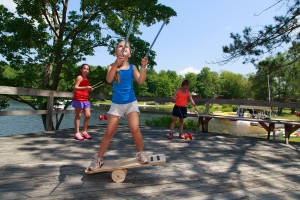 There are no deadlines. There are no exams. It’s completely a ‘participate to the level of your comfort’ environment. All campers are encouraged to try camp STEM related programs at least once during the summer, but some find a new interest or passion and return several times. The ‘participate as you wish’ approach also allows campers to choose how to focus their interests. Counselors, often college majors or professionals in the area that they lead, are facilitators. They are there to encourage and assist campers in channeling their efforts into particular aspect of a STEM related activity if they so desire.
There are no deadlines. There are no exams. It’s completely a ‘participate to the level of your comfort’ environment. All campers are encouraged to try camp STEM related programs at least once during the summer, but some find a new interest or passion and return several times. The ‘participate as you wish’ approach also allows campers to choose how to focus their interests. Counselors, often college majors or professionals in the area that they lead, are facilitators. They are there to encourage and assist campers in channeling their efforts into particular aspect of a STEM related activity if they so desire.
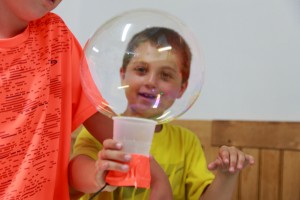 Second, the whole point of summer camp is for campers to have fun. So it goes without saying that camp activities are designed to emphasize fun, even those related to subject areas in which students are traditionally less than enthusiastic during the school year. In that regard, educational niche programs at sleepaway camp aren’t intended to compete with or replace the learning that takes place during the school year, but to enhance it.
Second, the whole point of summer camp is for campers to have fun. So it goes without saying that camp activities are designed to emphasize fun, even those related to subject areas in which students are traditionally less than enthusiastic during the school year. In that regard, educational niche programs at sleepaway camp aren’t intended to compete with or replace the learning that takes place during the school year, but to enhance it.
Third, there is a healthy mixture of activity. Unlike a school setting in which students move through subjects throughout the day typically in a lecture setting, at least half of the day at a traditional summer camp is spent outside where campers take part in sports and water activities. Many camps also incorporate a designated time to rest into their programming day in order to give campers and staff the opportunity to recharge. So those program activities that could be perceived as educational are mixed in with healthy doses of physical activity and relaxation. This allows campers proper time and space to both process the activities in which they take part throughout the day and to approach future activities with a fresh mind.
Although traditional summer camp STEM related programs are not intended to replace those offered in schools, they may ultimately be equally attributable to inspiring future scientists, technologists, engineers, or mathematicians by encouraging campers to explore these subjects in ways and to a level that they might not get to do during the school year. Some campers may carry a new found interest in these subject areas home and take on a new enthusiasm at school, making summer camp STEM related programs an invaluable addition to their program lineup.
be equally attributable to inspiring future scientists, technologists, engineers, or mathematicians by encouraging campers to explore these subjects in ways and to a level that they might not get to do during the school year. Some campers may carry a new found interest in these subject areas home and take on a new enthusiasm at school, making summer camp STEM related programs an invaluable addition to their program lineup.
They Just Don’t Get It
Tuesday, December 10th, 2013As the winter season is upon us, for many people, memories of the summer are fading but for a bunch of us, summer is still very much on the forefront of our minds. This is because we are camp counselors. Even though it’s been 4 months since we were at Camp Starlight, we are not quite used to the “real world” yet and long for a time when singing songs about napkins and moustaches is normal. A place where tutus for men, suspenders made of duct tape, and blue and white face pant is just typical everyday attire. A place that you “get” and it “gets” you.
You can never truly explain to people who have not spent a summer at Camp Starlight what the experience is like and trying to get them to understand a story or sing along with hand motions to a song is lost on them. Why don’t they understand how eating a piece of cantaloupe is important, or why this square dancing bracelet is a bragging rite? Why don’t they get it?
Only the lucky ones that have worked at camp can empathize with what we go through; trying to explain how hard but crazy good our kids were, why you can’t stop singing those songs, or why if you see a child you immediately turn back into a counselor.
I guess you have to realize that the summer of your life was unique and special and something most people will never “get”. But that won’t stop you from trying to get others to come with you next summer to Camp Starlight!
It’s Summer Camp Recruiting Season
Tuesday, December 3rd, 2013 Attention college and university students: Have you started to think about how you’re going to spend next summer? Sure, it’s almost winter. It’s cold outside, and the thing you’re most worried about now are your upcoming finals. Perhaps in the back of your mind you’ve toyed with the idea of applying for an internship or two. But have you considered working at sleepaway camp? Right now, in the late fall and dead of winter, many summer camps are on tour, making stops at schools throughout the country and recruiting events around the world in search of the most caring, dedicated, enthusiastic and fun students who are interested in working with children. If you’re taking courses to become a professional in any field that pertains to the education, coaching or care of children, a summer spent working at camp is more valuable than any internship. Imagine how much you can dress up your resume after a summer living and working with children. Your understanding of diversity and your communication skills will also get a big boost because you’ll be working alongside people from all over the world, all walks of life, and from a variety of professions. Best of all, you literally get paid to spend most of your days outdoors having fun while participating in activities with your campers!
Attention college and university students: Have you started to think about how you’re going to spend next summer? Sure, it’s almost winter. It’s cold outside, and the thing you’re most worried about now are your upcoming finals. Perhaps in the back of your mind you’ve toyed with the idea of applying for an internship or two. But have you considered working at sleepaway camp? Right now, in the late fall and dead of winter, many summer camps are on tour, making stops at schools throughout the country and recruiting events around the world in search of the most caring, dedicated, enthusiastic and fun students who are interested in working with children. If you’re taking courses to become a professional in any field that pertains to the education, coaching or care of children, a summer spent working at camp is more valuable than any internship. Imagine how much you can dress up your resume after a summer living and working with children. Your understanding of diversity and your communication skills will also get a big boost because you’ll be working alongside people from all over the world, all walks of life, and from a variety of professions. Best of all, you literally get paid to spend most of your days outdoors having fun while participating in activities with your campers!
If you think working at camp sounds great but you’re not a person currently majoring in an area related to children, don’t be discouraged. Although students are typically placed in camp counselor positions, there are many different types of roles at summer camp, and summer camp recruiters are always excited to meet and chat with candidates of any college major who may fill a special niche position. So even if you aren’t an athlete or education major, if you think you have a special talent or quality that you can bring as a camp staff member, don’t hesitate to pay summer camp recruiters a visit when they’re at your campus. You might just be that special candidate who is difficult to find but for whom a camp has definitely been searching.
be discouraged. Although students are typically placed in camp counselor positions, there are many different types of roles at summer camp, and summer camp recruiters are always excited to meet and chat with candidates of any college major who may fill a special niche position. So even if you aren’t an athlete or education major, if you think you have a special talent or quality that you can bring as a camp staff member, don’t hesitate to pay summer camp recruiters a visit when they’re at your campus. You might just be that special candidate who is difficult to find but for whom a camp has definitely been searching.
 There are a few things prospective staff members should be aware of, though, and recruiters like to be up front with candidates. Working at summer camp is fun, and you’re certainly not going to be fetching coffee (except for yourself at meal times) or be lost in Excel spreadsheets cursing the invention of pivot tables. But you will work harder at summer camp than you probably ever have or maybe even ever will again. In fact, we in the summer camp industry have a motto that working at summer camp is the “hardest job you’ll ever love.” The hours are long. You can expect to be on duty from breakfast to bedtime, typically, six days a week. Summer camp is extremely fast paced and the environment is best described as “organized chaos,” so you have to be able to keep up with the pace and make split second decisions. Being able to stay optimistic and provide encouragement, even when it’s storming outside, you’re stuck in the bunk, and the soccer team (of which most of your campers are a part) just lost a big game, is critical. You have to be able to put on a smile and choose a positive attitude even on days when you wake up not quite feeling the summer camp vibe. You must also be able to care about and for someone else’s children as if they are your own for several weeks. It’s important to remember that those campers assigned to you are your campers for the entire duration of camp, and you are expected to do your best to make sure that ALL of them have equal opportunity to have an amazing summer. If you’re dependent on your tech gadgets, you’ll likely experience a bit of culture shock. Summer camps encourage campers to enjoy their natural surroundings and restrict the use of most electronic equipment such as cell phones, laptops, iPads, and Kindles. Staff members may keep them in camp lockers or safes for use in their off time, but they may not be kept in bunks or used while on duty.
There are a few things prospective staff members should be aware of, though, and recruiters like to be up front with candidates. Working at summer camp is fun, and you’re certainly not going to be fetching coffee (except for yourself at meal times) or be lost in Excel spreadsheets cursing the invention of pivot tables. But you will work harder at summer camp than you probably ever have or maybe even ever will again. In fact, we in the summer camp industry have a motto that working at summer camp is the “hardest job you’ll ever love.” The hours are long. You can expect to be on duty from breakfast to bedtime, typically, six days a week. Summer camp is extremely fast paced and the environment is best described as “organized chaos,” so you have to be able to keep up with the pace and make split second decisions. Being able to stay optimistic and provide encouragement, even when it’s storming outside, you’re stuck in the bunk, and the soccer team (of which most of your campers are a part) just lost a big game, is critical. You have to be able to put on a smile and choose a positive attitude even on days when you wake up not quite feeling the summer camp vibe. You must also be able to care about and for someone else’s children as if they are your own for several weeks. It’s important to remember that those campers assigned to you are your campers for the entire duration of camp, and you are expected to do your best to make sure that ALL of them have equal opportunity to have an amazing summer. If you’re dependent on your tech gadgets, you’ll likely experience a bit of culture shock. Summer camps encourage campers to enjoy their natural surroundings and restrict the use of most electronic equipment such as cell phones, laptops, iPads, and Kindles. Staff members may keep them in camp lockers or safes for use in their off time, but they may not be kept in bunks or used while on duty.
If you’re still reading after the “hard parts” of the job, you must really be interested in working at camp. So now that we have most of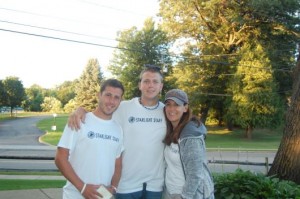 the difficult aspects out of the way, here are some fun and rewarding parts of the job. Your summer will be rent free. You’ll likely live in a bunk with another counselor or two and 8-12 campers. You’ll eat free, too, as your meals are provided. What that translates to is that you can save most or even all of your salary if you have no other financial obligations. The ability to be completely silly on the job when the situation merits is actually commendable. You’ll also get paid to play sports, swim, sail, make clay pots, build woodworking projects, make arts and crafts, do fun science and nature experiments, play crazy games, be in camp shows, go on trips with your campers, etc. You’ll likely make more friends in one summer than you have in the past several combined…real friends. Not just Twitter or Instagram followers. You’ll get to know some children who will remain in your heart long after camp has ended. You’ll also get to meet some staff members who choose to return to camp summer after summer. You may even decide that one summer working at camp is just not enough for you either. Regardless, a summer as a camp staff member just may be the summer that changes your life. Summer camps often get emails or phone calls from former staff members explaining how their time at camp clarified an education or career path. Sometimes it’s the collective of everything that happens over the summer that so profoundly affects staff members. Sometimes it’s a single moment.
the difficult aspects out of the way, here are some fun and rewarding parts of the job. Your summer will be rent free. You’ll likely live in a bunk with another counselor or two and 8-12 campers. You’ll eat free, too, as your meals are provided. What that translates to is that you can save most or even all of your salary if you have no other financial obligations. The ability to be completely silly on the job when the situation merits is actually commendable. You’ll also get paid to play sports, swim, sail, make clay pots, build woodworking projects, make arts and crafts, do fun science and nature experiments, play crazy games, be in camp shows, go on trips with your campers, etc. You’ll likely make more friends in one summer than you have in the past several combined…real friends. Not just Twitter or Instagram followers. You’ll get to know some children who will remain in your heart long after camp has ended. You’ll also get to meet some staff members who choose to return to camp summer after summer. You may even decide that one summer working at camp is just not enough for you either. Regardless, a summer as a camp staff member just may be the summer that changes your life. Summer camps often get emails or phone calls from former staff members explaining how their time at camp clarified an education or career path. Sometimes it’s the collective of everything that happens over the summer that so profoundly affects staff members. Sometimes it’s a single moment.
So if you want that summer that’s different, that will set your experiences apart from those of many of your friends, then be on the lookout over the next few months for a visiting camp recruiter and go into spring break free of worries about how you’re going to spend your summer. If you happen to miss the campus tour, don’t be discouraged. You can also apply to work at summer camp through the Camp Starlight website.
The Importance of Evening Activities at Summer Camp
Tuesday, November 26th, 2013 The typical image of evenings at summer camp involves campers sitting around a campfire roasting marshmallows and singing songs. While campfires are an essential part of the camp experience and many camps enjoy campfires nightly or weekly — they’re only the tip of the iceberg when it comes to after dinner activities. While some nights, particularly those following busier than usual days, are “chill” nights at camp during which campers watch a movie, enjoy a camp show or, yes, sit around that infamous campfire, on most nights, the action heats up when the sun goes down and things get crazy—sometimes really crazy—and maybe even a little goofy.
The typical image of evenings at summer camp involves campers sitting around a campfire roasting marshmallows and singing songs. While campfires are an essential part of the camp experience and many camps enjoy campfires nightly or weekly — they’re only the tip of the iceberg when it comes to after dinner activities. While some nights, particularly those following busier than usual days, are “chill” nights at camp during which campers watch a movie, enjoy a camp show or, yes, sit around that infamous campfire, on most nights, the action heats up when the sun goes down and things get crazy—sometimes really crazy—and maybe even a little goofy.
Whether it’s a dance, an evening of games, or a scavenger hunt, it’s important to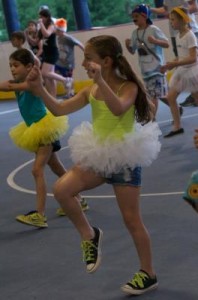 dress for the occasion and costumes are typically encouraged. Acceptable attire often includes tutus, crazy hats or wigs, temporary tattoos and face or body paint. When competition is involved, dressing in team colors is also a must. Friends or even entire bunks/cabins try to mirror each other with matching outfits, and showing team spirit typically becomes a competition within a competition. Clever cheers (often involving inside camp jokes), singing, and loud encouragement provide the soundtrack to a night of activities designed to help everyone let loose, be themselves, and, most importantly, have fun. So what is the point of so much silliness after a full day of activities? It’s simple. Play. Play has long been touted by child psychologists as crucial to social and cognitive development. At camp, however, the kind of play that happens during evening activities takes on a much bigger role as an avenue for inspiring campers and staff alike to embrace camp values and put them into action.
dress for the occasion and costumes are typically encouraged. Acceptable attire often includes tutus, crazy hats or wigs, temporary tattoos and face or body paint. When competition is involved, dressing in team colors is also a must. Friends or even entire bunks/cabins try to mirror each other with matching outfits, and showing team spirit typically becomes a competition within a competition. Clever cheers (often involving inside camp jokes), singing, and loud encouragement provide the soundtrack to a night of activities designed to help everyone let loose, be themselves, and, most importantly, have fun. So what is the point of so much silliness after a full day of activities? It’s simple. Play. Play has long been touted by child psychologists as crucial to social and cognitive development. At camp, however, the kind of play that happens during evening activities takes on a much bigger role as an avenue for inspiring campers and staff alike to embrace camp values and put them into action.
 At least one of these three key words consistently appears in camp mottos: “tradition”, “family”, “friends.” All three are emphasized during evening activities at camp. Whether it’s to win a competition or be the first across the finish line in a race, playful evening activities are a fun way for campers to come together as a family to achieve a common goal. More importantly, individual age divisions often spend time together during evening activities. During the day, campers go in many different directions, depending on their interests and program schedules. In the evenings, however, they come back together as a group. In the midst of lighthearted moments, friendships are born and strengthened.
At least one of these three key words consistently appears in camp mottos: “tradition”, “family”, “friends.” All three are emphasized during evening activities at camp. Whether it’s to win a competition or be the first across the finish line in a race, playful evening activities are a fun way for campers to come together as a family to achieve a common goal. More importantly, individual age divisions often spend time together during evening activities. During the day, campers go in many different directions, depending on their interests and program schedules. In the evenings, however, they come back together as a group. In the midst of lighthearted moments, friendships are born and strengthened.
Sleepaway camp traditions are evident—or sometimes born—in even the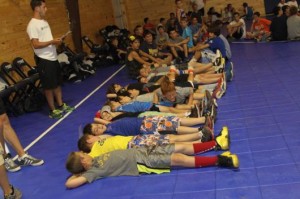 wackiest moments of evening activities. Those activities become perennial favorites to which campers look forward all year. They spend time during the winter contemplating ways in which they can enhance tradition and future memories by building upon previous experiences of those activities. They communicate with each other, brainstorm ideas and even make plans. In short, through play, campers take ownership of their camp experiences as well as their camp traditions. In doing so, they embrace camp values.
wackiest moments of evening activities. Those activities become perennial favorites to which campers look forward all year. They spend time during the winter contemplating ways in which they can enhance tradition and future memories by building upon previous experiences of those activities. They communicate with each other, brainstorm ideas and even make plans. In short, through play, campers take ownership of their camp experiences as well as their camp traditions. In doing so, they embrace camp values.
10 Camp Things for Which We’re Thankful All Year Long
Tuesday, November 19th, 2013 The holidays are upon us and ‘tis the season to ponder those things for which we’re truly thankful. For those of us who are fortunate enough to eat, sleep, and breathe camp 24/7, 365 days a year, it’s hard not to make an exclusive “Camp Starlight” list. After all, Camp Starlight is just as much a part of our lives in November as it is in June. So we figured we’d share some camp things for which we are thankful all year.
The holidays are upon us and ‘tis the season to ponder those things for which we’re truly thankful. For those of us who are fortunate enough to eat, sleep, and breathe camp 24/7, 365 days a year, it’s hard not to make an exclusive “Camp Starlight” list. After all, Camp Starlight is just as much a part of our lives in November as it is in June. So we figured we’d share some camp things for which we are thankful all year.
1.) Our campers. Each and every one of our campers brings something unique to camp that makes our camp family complete. Getting emails and phone calls about our campers’ accomplishments throughout the winter makes the memories we have of the summer that much more special and makes us even more excited for next summer to get here.
2.) Our camp parents. We feel pretty lucky to have so many parents who are as enthusiastic about camp as their children and who keep in touch throughout the winter, providing us with fun and interesting updates.
keep in touch throughout the winter, providing us with fun and interesting updates.
3.) Our staff. Finding a staff of talented people who are willing to leave their first homes and make summer camp their second home for several weeks each summer in order to literally live their jobs day and night is no easy feat. That we’re able to put together a staff each summer who is so vested in creating an amazing summer for all of our campers is truly a blessing.
4.) Alumni. It’s always a special treat when our alumni share their favorite camp memories and reiterate how great their camp years were. The fact that so many of our alumni are still in touch and/or are active within our community says a lot to us about just how special camp is and motivates us to continue to strive to make camp a lifetime worth of memories.
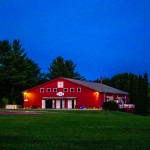 5.) A beautiful campus. That first drive into camp each summer is always so special. No matter how many times we’ve been there, that first up the camp road and glance at alumni field, the bunks/cabins, the dining hall, the courts, and the waterfront each summer is something we anticipate all year long.
5.) A beautiful campus. That first drive into camp each summer is always so special. No matter how many times we’ve been there, that first up the camp road and glance at alumni field, the bunks/cabins, the dining hall, the courts, and the waterfront each summer is something we anticipate all year long.
6.) Memories. Memories are what makes each summer different than the last. We find ourselves asking each other, “Remember when…?” and laughing over our favorite camp moments throughout the year.
7.) Camp Songs. We often find ourselves turning up the volume whenever a song that proved popular the summer before plays on the radio or humming the alma mater or a favorite dining room tune while we’re busy planning for next summer.
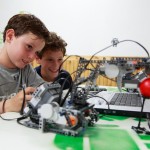 8.) Camp friends. It’s so nice to have someone with whom we can remember those special moments from previous summers and with whom we can have a hearty laugh about those inside moments that only our camp friends can understand. It’s also nice to be able to re-experience camp through meetups throughout the winter and makes us even that much more excited about next summer.
8.) Camp friends. It’s so nice to have someone with whom we can remember those special moments from previous summers and with whom we can have a hearty laugh about those inside moments that only our camp friends can understand. It’s also nice to be able to re-experience camp through meetups throughout the winter and makes us even that much more excited about next summer.
9.) The camp tradition. It sounds pretty obvious, but just the fact that we’re able to carry on such a beloved tradition is a privilege. Summer camps have been around for more than a hundred years and are such an iconic part of our culture that movies and television shows have been made and books have been written about summer camp. Not to mention, without summer camp, we’re not quite sure what we’d be doing. We certainly can’t imagine doing anything else.
10.) The promise of next summer. We’ve said it a million times, but we start anticipating the next summer as soon as the buses pull away. That ten month wait each year seems like forever, but it proves to be just enough time to plan another summer that promises to be even better than the last. The anticipation drives us all year long as we plan and makes us thankful to be part of camp all year.
away. That ten month wait each year seems like forever, but it proves to be just enough time to plan another summer that promises to be even better than the last. The anticipation drives us all year long as we plan and makes us thankful to be part of camp all year.



